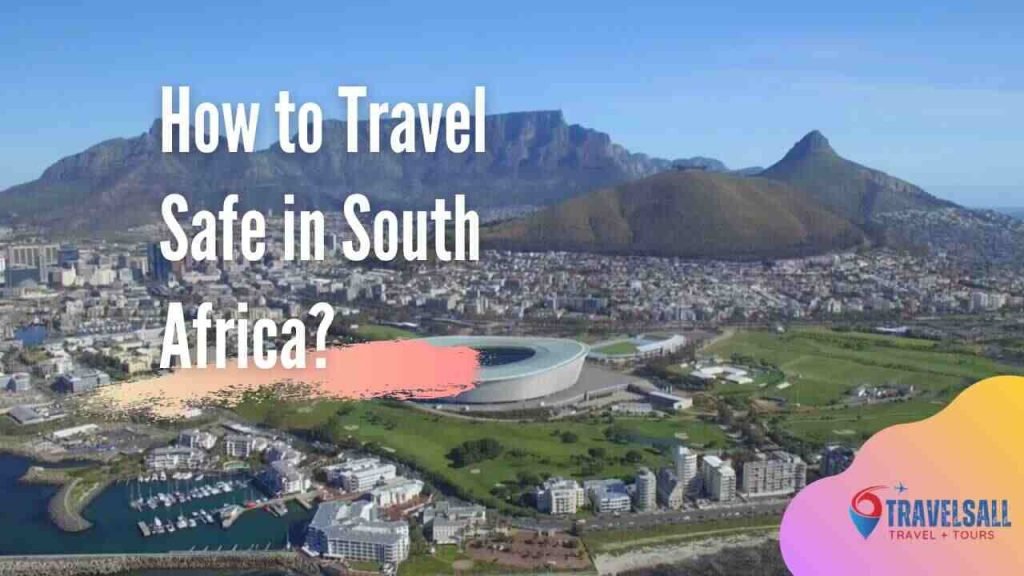To Travel Safe in South Africa, prioritize well-researched planning and stay vigilant. Equip yourself with safety gear and seek local advice on areas to avoid.
Starting on an adventure to South Africa requires a smart approach to security and health precautions to ensure a memorable experience.
This diverse and culturally rich nation attracts millions with its stunning landscapes, wildlife, and vibrant cities. Like any destination, safety concerns exist; however, knowledge is power.
Stay informed, follow safety advice, and blend in with locals to minimize risks. Prepare beforehand by researching travel advisories, regional distinctions, and emergency contact information.
Respect local customs, secure belongings, prioritize well-being, and explore South Africa’s wonders from Table Mountain to Kruger Park.
Table of Contents
ToggleEmbracing The Rainbow Nation’s Diversity
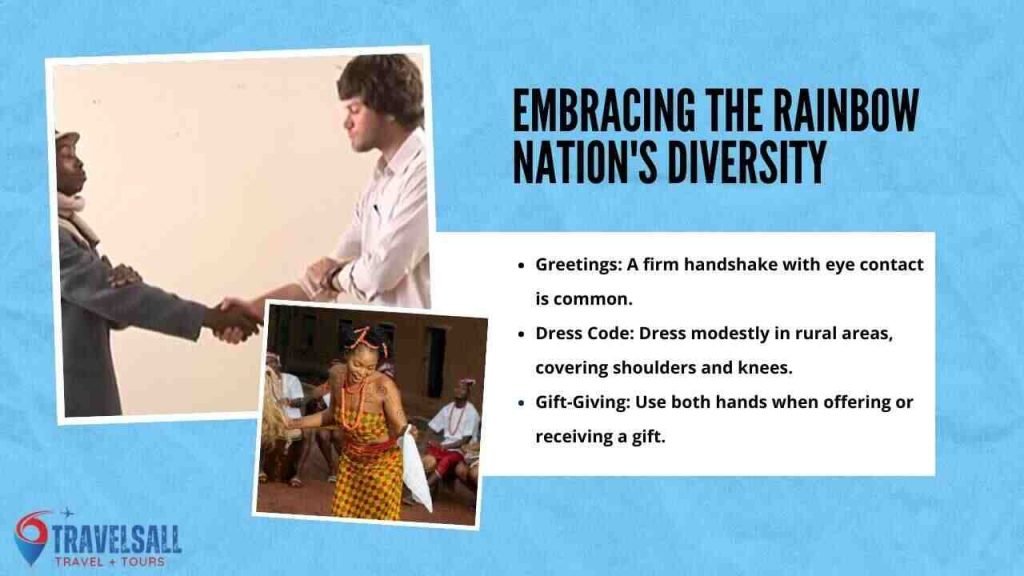
South Africa, often called the Rainbow Nation, is a vibrant mosaic of cultures. As a traveler, enjoying this diversity enriches your journey.
Learning about customs and languages forms the key to a respectful and fulfilling experience. Start on a colorful adventure and dig into the heart of South Africa’s heritage.
Cultural Sensitivity And Etiquette
When you step into South Africa’s world, respect is crucial. This land has Zulu warriors, Xhosa farmers, and Afrikaans artists.
Each culture comes with its rules and traditions. Remember, a polite ‘please’ and ‘thank you’ open doors in any language.
- Greetings: A firm handshake with eye contact is common.
- Dress Code: Dress modestly in rural areas, covering shoulders and knees.
- Gift-Giving: Use both hands when offering or receiving a gift.
Language Tips For Navigating South Africa
South Africa speaks many languages. English is widely understood, but learning a few local phrases goes a long way. Here are some basics to get you started:
| Phrase | Meaning | Language |
|---|---|---|
| Molo | Hello | Xhosa |
| Howzit | Hi, how are you? | English (Slang) |
| Dankie | Thank you | Afrikaans |
Keep a translation app handy. Smile and try to speak local tongues. Most of all, enjoy the journey embracing South Africa’s diversity.
Pre-trip Preparations
Before starting on your South African adventure, proper planning is key. Safe travel starts with ensuring all paperwork is in order and health measures are taken. Read on to ensure your journey begins smoothly!
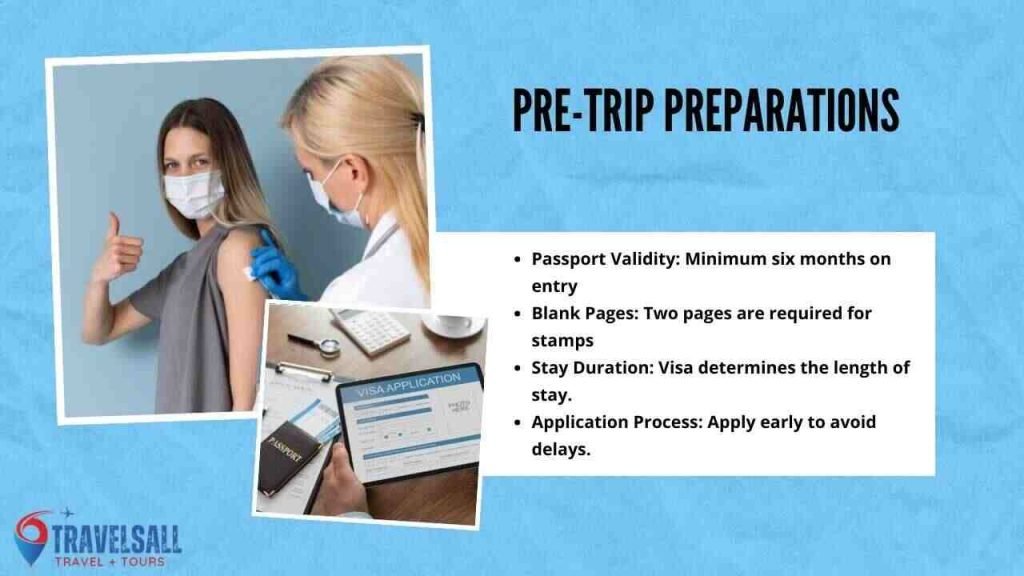
Visa Requirements And Validations
Mastering visa requirements for South Africa is essential. Ensure your passport has at least two blank pages and is valid for 30 days post-departure. Obtain the correct visa, if required, well in advance.
Take note of the following:
- Passport Validity: Minimum six months on entry
- Blank Pages: Two pages are required for stamps
- Stay Duration: Visa determines the length of stay.
- Application Process: Apply early to avoid delays.
Health Precautions And Vaccinations
Your health is paramount when traveling. South Africa may require certain vaccinations. Consult your doctor at least one month before traveling. Carry enough prescription medication for your trip’s duration.
Consider the following:
| Vaccination | Description | Requirement |
|---|---|---|
| Yellow Fever | Required if coming from a yellow fever zone. | Mandatory |
| Hepatitis A & B | Recommended for all travelers. | Advised |
| Typhoid | Recommended based on your travel itinerary. | Advised |
| Rabies | Consider if involved in outdoor activities. | Optional |
Also pack a first-aid kit, sunscreen, and insect repellent. Stay hydrated and protect yourself from the sun. Always have medical insurance that covers international travel.
Selecting Safe Destinations
Traveling to South Africa offers dazzling experiences. Yet, safety is key. Smart travelers plan. They choose destinations wisely. Research and knowledge play a vital role.
Researching Tourist-friendly Areas
Bright city spots attract visitors. Iconic sites like Cape Town and Johannesburg’s Sandton are favorites.
They offer strong security and a welcoming atmosphere. Check travel forums, blogs, and official tourism websites. Look for recent reviews. They give current safety insights.
Avoiding High-risk Zones
Danger zones exist. Avoid areas with high crime rates. Some neighborhoods are not for tourists.
Local advice is gold. Ask hotel staff or tour guides. They know the spots to skip.
| Do’s | Don’ts |
|---|---|
| Choose well-lit, busy streets. | Wander in remote areas at night. |
| Visit popular tourist sites. | Flash valuables in public spaces. |
| Follow local safety advice. | Ignore travel warnings and alerts. |
- Stay in known tourist areas.
- Use recommended transport services.
- Always have emergency numbers at hand.
Remember, fun travels need safe choices. Enjoy South Africa with peace of mind. Plan smart, be aware, and keep safe.
Knowing Local Transport Options
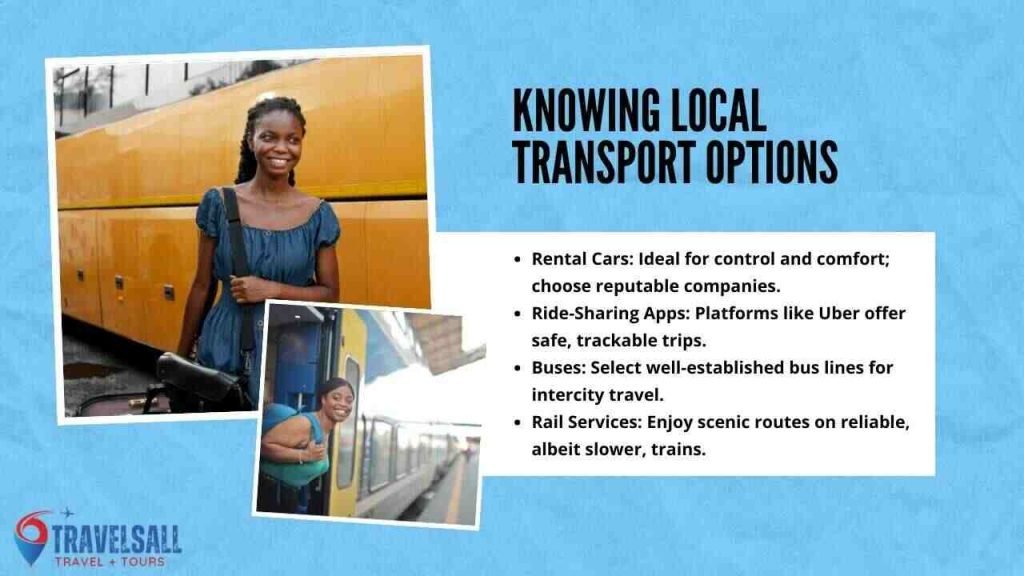
South Africa’s beauty and diversity make it a sought-after destination. Yet, navigating through this vibrant land requires some know-how, especially regarding local transport.
Different modes of transport can whisk you from the bustling streets of Johannesburg to the scenic drives of the Garden Route. This section covers which options to choose and how to use them safely.
Choosing Reliable Transportation
Safety and reliability are vital when selecting your transport method in South Africa. Here’s a brief guide:
- Rental Cars: Ideal for control and comfort; choose reputable companies.
- Taxis: Opt for official taxi services; avoid unmarked cars.
- Ride-Sharing Apps: Platforms like Uber offer safe, trackable trips.
- Buses: Select well-established bus lines for intercity travel.
- Rail Services: Enjoy scenic routes on reliable, albeit slower, trains.
Tips For Using Public Transport Securely
Public transportation is economical and frequent in urban areas. Follow these tips for a secure journey:
- Stay vigilant: Keep your belongings close and be aware of your surroundings.
- Travel during the day: Dimly lit areas increase risks at night.
- Know your route: Plan and understand the timetables.
- Stay in groups: There is safety in numbers, especially in unfamiliar areas.
- Keep emergency numbers handy: Save local helplines on your phone.
Staying Secure In South African Accommodation
Exploring South Africa promises an unforgettable journey. But when night falls, a comfortable and safe place to rest is crucial.
In this section, we’ll cover essential tips to ensure your stay is as secure as it is comfortable. Learn how to select the best hotels and navigate the ins and outs of Airbnb and rentals.
Vetting Hotels And Guesthouses
- Check reviews: Look at past guests’ experiences on trusted platforms.
- Location matters: Choose accommodations in well-lit, populated areas.
- Contact directly: Ask about security measures before booking.
- Seek local advice: Confirm your choices with locals or travel forums.
Ensure the property has 24/7 front desk service and if possible, on-site security personnel. Secure parking and the availability of safes in rooms add an extra layer of safety for your belongings.
Safety Measures For Airbnb And Rentals
- Communicate through the platform: Keep all correspondence on Airbnb to protect your information.
- Review host profiles: Ensure they have positive ratings and verified status.
- Emergency preparedness: Ask if there are smoke detectors, first-aid kits, and fire extinguishers.
- Secure entry: Choose places with solid locks, or keyless entry systems.
Snap photos when you arrive and before you leave. This protects against potential damage claims.
Also, familiarize yourself with escape routes and local emergency contacts upon arrival.
By following these steps, you’ll be poised for a safer stay, leaving you free to focus on the beauty and adventure that South Africa offers.
Keeping Healthy While Traveling
Keeping healthy while traveling is a priority to fully enjoy South Africa’s vibrancy. With its stunning landscapes and rich culture, the last thing you want is health issues ruining the experience.
Ensuring food safety and knowing how to access medical care are crucial steps. Read on for practical tips on how to stay healthy and relish every moment of your South African adventure.
Food Safety In South Africa
South Africa’s culinary scene is as diverse as its heritage. To keep safe, follow these simple tips:
- Avoid tap water – Opt for bottled or purified water.
- Eat well-cooked meals – It reduces the risk of foodborne diseases.
- Wash fruits and vegetables – Use clean water to avoid contamination.
- Choose reputable eateries – Look for busy spots popular with locals.
Practicing good hygiene and making wise food choices are keys to avoiding stomach upsets.
Accessing Medical Care In Emergencies
Despite your best efforts, emergencies can happen. Being prepared can make all the difference. Here’s what you do:
- Know the number – Dial 10177 for an ambulance.
- Carry a health card – List allergies and blood type on it.
- Travel insurance is a must – Ensure it covers health emergencies.
- Locate the nearest hospital – Keep the address handy.
With these tips in mind, you can focus on the beauty around you, knowing you’re prepared for any health issues.
Protecting Your Belongings
Welcome to the “Protect Your Belongings” chapter of your South Africa travel guide! South Africa dazzles with its diverse landscapes and rich culture.
Yet, personal belonging and safety are key for a worry-free journey. Let’s explore hands-on strategies to secure your valuables.
Theft-proofing And Loss Prevention
Keep your valuables out of sight to avoid temptation for thieves. Use a hidden money belt or a neck pouch for important items.
Bags with anti-theft features, like lockable zippers and cut-resistant materials, are smart picks.
- Never leave items unattended.
- Lock up your belongings in hotel safes.
- Distrust strangers offering unsolicited help.
Carry only what’s necessary for the day. Prefer front-facing backpacks in crowded areas. Keep a close watch on busy markets or train stations.
Insurance And Backup For Important Documents
Before your trip, opt for travel insurance that covers theft and loss. This will ease your mind if something goes missing.
Make digital copies of your vital documents, such as your passport, visa, and ID. Store them in a secure cloud service.
| Document | Backup Method |
|---|---|
| Passport | Email, Cloud Storage |
| Travel Insurance | Digital Copy, Family/Friend |
| Flight and Accommodation Details | Travel App, Printed Copy |
Inform your credit card company of your travel plans. This prevents fraud alerts from blocking your card. Carry a list of emergency contacts on paper and your phone.
- Print copies of your itinerary.
- Save important numbers in two places.
- Use password protection on your devices.
By adopting these proactive steps, you can focus on the breathtaking views and vibrant culture around you, enjoying an unforgettable South African adventure.
Navigating Safely On South African Roads
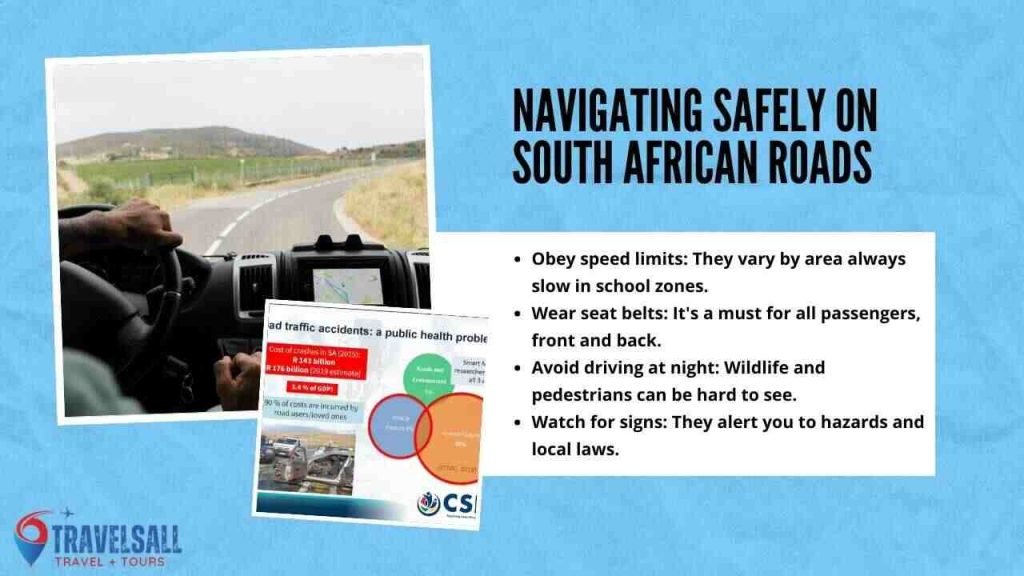
Traveling by road in South Africa can be a breathtaking experience. The country boasts a diverse landscape, from the coastal routes of the Cape to the bushveld in Limpopo.
But to enjoy these vistas without worry, it’s key to follow local road safety practices.
Road Safety Practices
- Obey speed limits: They vary by area always slow in school zones.
- Wear seat belts: It’s a must for all passengers, front and back.
- Avoid driving at night: Wildlife and pedestrians can be hard to see.
- Watch for signs: They alert you to hazards and local laws.
- Keep valuables hidden: Prevent break-ins by storing items out of sight.
- Stay alert: Always keep an eye out for erratic drivers or animals on the road.
Self-driving Vs Hiring A Local Driver
| Self-Driving | Hiring a Local Driver |
|---|---|
| Full control of route and pace Freedom to explore off-the-beaten paths Requires good map skills and local knowledge Potential higher stress from unfamiliar roads | Local insights into culture and areas No need to navigate or handle traffic May increase security in unfamiliar locales Costs more than self-driving |
Pro tip: Familiarize yourself with local traffic laws. They might differ from those in your home country.
Whether you choose to explore on your own or trust a local with the wheel, remember to always prioritize safety.
Communicating During Your Trip
Starting on an adventure in South Africa can be thrilling. Yet, staying in touch and ensuring safety is key.
This section digs into effective communication practices during a South African journey. Keep reading to learn how to remain connected and informed throughout your travels.
Staying Connected With Reliable Mobile Services
Keeping your phone active in South Africa is a must for safety and convenience. Opt for a local SIM card for cost-effective calls and data. Here are the steps:
- Choose a local mobile provider: Vodacom, MTN, and Cell C are popular choices.
- Purchase a SIM card: Buy one at the airport, malls, or mobile shops.
- Register your SIM: South African law requires RICA registration. Bring your passport and address details.
- Top-up with airtime and data packages: Select a bundle that suits your needs.
For seamless connection, ensure compatibility of your handset with South African networks. Most operate on GSM networks.
Emergency Contact Numbers And Consulate Information
In emergencies, quick access to the right numbers is crucial. Keep these contacts handy:
| Service | Contact Number |
|---|---|
| Police | 10111 |
| Ambulance | 10177 |
| National Emergency | 112 (from mobile) |
| Tourist Safety | 0861 874 911 |
For country-specific assistance, locate your consulate:
- Find the nearest consulate before departure.
- Save their contact details in your phone and keep a paper copy.
- Check their services for travelers in case you need legal help or have lost your passport.
Stay informed by checking your government’s travel advisories for South Africa regularly.
Respecting Wildlife And Natural Hazards
South Africa’s landscapes are a tapestry of breathtaking sceneries and wild creatures. Adventure awaits in every corner, but it comes with responsibility.
Tourists must understand the importance of safety around the natural inhabitants and unpredictable elements. This guide aims to educate travelers on the right way to honor nature while keeping safe.
Guidelines For Wildlife Encounters
Witnessing South Africa’s wildlife is a privilege that requires respect. Follow these guidelines to enjoy encounters safely:
- Stay in your vehicle during safaris unless a guide says otherwise.
- Keep a safe distance from animals, especially the Big Five.
- Avoid loud noises; they can stress the animals.
- Never feed wildlife. It alters their natural behaviors.
- Follow park rules and guidelines at all times.
Awareness Of Environmental Risks
The great outdoors holds hidden dangers. Be aware of these environmental risks:
| Risk | Precaution |
|---|---|
| Sun Exposure | Apply sunscreen, wear hats, and drink water. |
| Rugged Terrain | Wear sturdy shoes and don’t stray from paths. |
| Dangerous Insects | Use insect repellent and check for bites. |
| Wild Weather | Always have a plan for sudden changes. |
By being prepared and respecting the wild, your journey through South Africa can be safe and unforgettable.
Always remember, that preserving the natural beauty and wildlife is our collective responsibility.
Frequently Asked Questions On How To Travel Safe In South Africa
How Can Tourists Stay Safe In South Africa?
To stay safe in South Africa, tourists should follow local advice, avoid flaunting valuables, use reputable transportation, stay alert in crowded places, and travel in groups after dark.
Is It Safe For Americans To Travel To South Africa?
Traveling to South Africa is generally safe for Americans, but they should stay informed about current safety guidelines and local conditions before and during their trip. Always exercise standard precautions against crime and follow travel advisories.
Is Cape Town Safer Than Johannesburg?
Cape Town is typically perceived as safer than Johannesburg. Statistics suggest a lower crime rate in Cape Town, enhancing its safety profile for residents and tourists alike. Always exercise general caution, regardless of the city.
How Safe Is Johannesburg For Tourists?
Johannesburg has safety concerns; tourists should exercise caution. Stick to well-traveled areas and follow local advice. Essential vigilance can mitigate risks.
Conclusion
Exploring the vibrant landscapes and rich culture of South Africa promises an unforgettable experience. Stay vigilant, keep these safety tips in mind, and embrace local wisdom on your journey. Armed with knowledge and caution, set forth to discover the wonders of South Africa securely.
Embrace your adventure with confidence!

